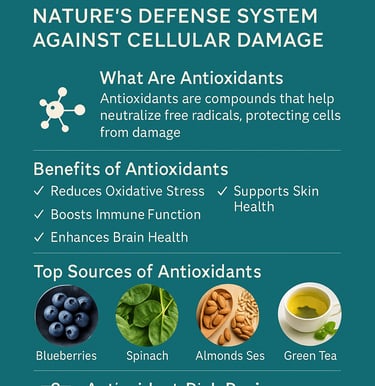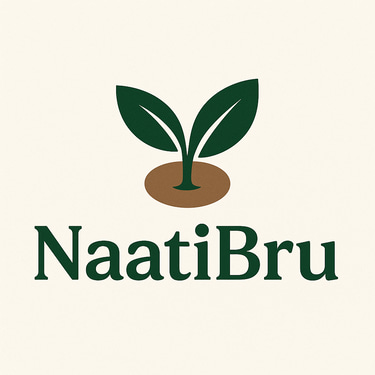Antioxidants: Nature’s Defense System Against Cellular Damage
Antioxidants are molecules that protect your body from damage caused by harmful molecules known as free radicals. These compounds play a crucial role in maintaining overall health, preventing diseases, and promoting longevity.
NUTRITION
Ravisankar Lakshminarayanan
5/25/20253 min read


Antioxidants: Nature’s Defense System Against Cellular Damage
Antioxidants are molecules that protect your body from damage caused by harmful molecules known as free radicals. These compounds play a crucial role in maintaining overall health, preventing diseases, and promoting longevity. With their increasing popularity in the health and wellness space, understanding antioxidants, their sources, and their benefits has become more important than ever.
What Are Antioxidants?
Antioxidants inhibit oxidation, a chemical reaction that can produce free radicals. Free radicals are unstable molecules formed during normal metabolic processes, exposure to toxins, pollution, and ultraviolet (UV) light. When free radicals accumulate, they can cause oxidative stress, damaging cells, proteins, and DNA, potentially leading to various health issues.
Antioxidants neutralize free radicals by donating an electron, effectively stabilizing these reactive molecules and preventing further damage.
Types of Antioxidants
Antioxidants can be classified into two categories based on their source:
Endogenous Antioxidants: Naturally produced by the body, including:
Superoxide Dismutase (SOD)
Catalase
Glutathione
Exogenous Antioxidants: Obtained from food and supplements, including:
Vitamins: Vitamin C, Vitamin E, and beta-carotene.
Minerals: Selenium, zinc, and manganese.
Polyphenols: Found in fruits, vegetables, and teas.
Carotenoids: Like lutein and zeaxanthin, found in colorful produce.
Benefits of Antioxidants
Reduces Oxidative Stress: Balances free radicals, reducing the risk of oxidative stress-related diseases such as cancer, heart disease, and diabetes.
Supports Skin Health: Protects skin from UV damage, reduces signs of aging, and promotes a healthy complexion.
Boosts Immune Function: Enhances the body's defense mechanisms against infections.
Improves Eye Health: Protects against cataracts and age-related macular degeneration.
Enhances Brain Health: Combats neurodegenerative conditions like Alzheimer's by protecting brain cells from oxidative damage.
Scientific Studies on Antioxidants
Polyphenols and Cardiovascular Health:
A study published in the Journal of Nutrition demonstrated that polyphenols in berries reduce arterial stiffness and improve cardiovascular health.
Vitamin C in Cancer Prevention:
Research in the Annals of Oncology suggested that Vitamin C’s role as an antioxidant may help reduce the risk of certain cancers, particularly those related to oxidative damage.
Neuroprotective Effects of Curcumin:
A study in Frontiers in Aging Neuroscience highlighted curcumin's ability to protect neurons from oxidative stress, thereby reducing the risk of Alzheimer’s disease.
Tea and Longevity:
Findings from the American Journal of Clinical Nutrition linked green tea consumption to increased lifespan and reduced oxidative stress markers.
Antioxidant-Rich Recipes
1. Berry Antioxidant Smoothie
Ingredients:
1 cup mixed berries (blueberries, raspberries, strawberries)
1 banana
1 cup unsweetened almond milk
1 tsp chia seeds
Instructions:
Blend all ingredients until smooth. Serve chilled.
2. Spinach and Avocado Salad
Ingredients:
2 cups fresh spinach leaves
1/2 avocado, sliced
1 tbsp olive oil
1 tsp lemon juice
1/4 tsp black pepper
Instructions:
Toss all ingredients in a bowl. Enjoy fresh.
3. Turmeric-Ginger Tea
Ingredients:
1 cup hot water
1/2 tsp turmeric powder
1/2 tsp freshly grated ginger
1 tsp honey
Instructions:
Steep ginger and turmeric in hot water for 5 minutes. Strain, add honey, and serve.
4. Dark Chocolate Walnut Bites
Ingredients:
100g dark chocolate (70% cocoa or higher)
1/2 cup chopped walnuts
Instructions:
Melt the chocolate, mix in walnuts, and spoon onto parchment paper. Let it set in the fridge.
How Antioxidants Work: Mechanisms of Action
Free Radical Neutralization: By donating electrons, antioxidants stabilize free radicals without becoming reactive themselves.
Enzyme Activation: Endogenous antioxidants catalyze reactions that break down harmful oxidants.
Repair Mechanisms: Vitamin C plays a role in repairing damaged DNA and other cellular structures.
Common Myths About Antioxidants
More is Better: Excessive supplementation can disrupt the balance and lead to pro-oxidant effects.
Antioxidants Work Instantly: Benefits are cumulative, requiring consistent intake over time.
Only Supplements Matter: Whole foods provide a synergistic effect, offering a mix of antioxidants and other beneficial nutrients.
Conclusion
Antioxidants are a cornerstone of a healthy diet and lifestyle. By protecting the body from oxidative damage, they prevent chronic diseases and promote wellness. A diet rich in colorful fruits, vegetables, nuts, and seeds is the easiest way to ensure you’re getting enough antioxidants.
Incorporate antioxidant-rich recipes, adopt a balanced diet, and consult with healthcare professionals for tailored advice to make the most of these nature-powered molecules.
Follow us
platanoorganic6@gmail.com
+919019754079
© 2025. All rights reserved.
FSSAI License no : 21223192000415
Platano Organic Foods
